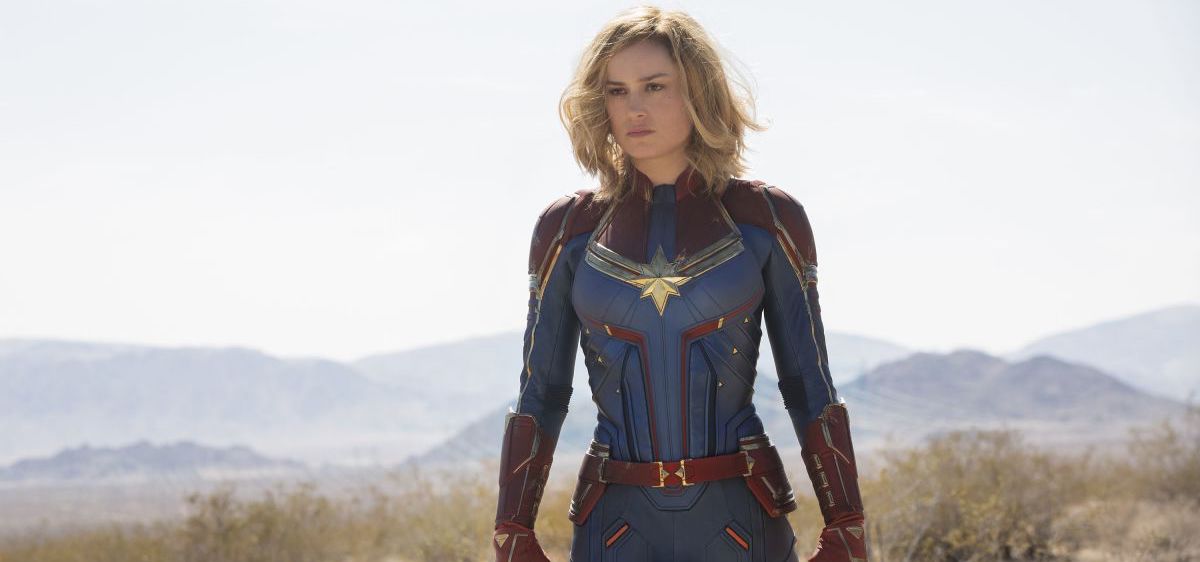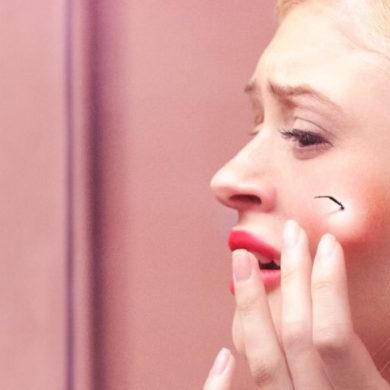Marvel Studios has finally dipped into a tier of superhero characters about which I know nothing. Ignorance is sometimes bliss and this time it allowed me to watch the latest entry into the Marvel Cinematic Universe (MCU) with no expectations. As I’ve written many times, when you have no expectations, it’s harder to be disappointed. All I wanted from Captain Marvel was to sit back and enjoy it. That’s exactly what I did and the rewards were plenty.
Academy Award winner Brie Larson fills the role, and her multi-colored rubber suit, quite well. She’s both familiar and mysterious, down to earth and exotic. She’s serious when she needs to be; but, with a grin always threatening to emerge from the side of her mouth, never too serious. Since so much of the movie revolves around the search for her true identity, I don’t want to spoil surprises. Let’s just say I found the “going home” theme more emotional and effective here than it was in Aquaman.
Marvel, with its uncanny ability to mix the right formula, pairs a possibly obscure character with a beloved one: Nick Fury (Samuel L. Jackson). When you think about it, we don’t know much about him, and Captain Marvel serves largely as his origin story. The two actors generate dynamite chemistry and, since the movie is part of a shared cinematic universe, establish a previously-unknown relationship that seems to be key for the upcoming Avengers: Endgame. In fact, it answers a pretty big question about the post-credit scene in Avengers: Infinity War.

Does that mean you have to be fully invested in previous MCU movies to get full enjoyment out of Captain Marvel? No. That’s just icing on the cake… Easter eggs, if you will, for longtime fans. Since it takes place in the mid-1990s, this could even be a starting point for newbies. I’m pretty sure when we’re one day looking back on all these films and someone suggests watching them in chronological order of events instead of release dates, this will be the first one recommended to watch. In other words, it’s never too late to jump on the Marvel bandwagon.
The only thing that even slightly bothered me about Captain Marvel was the appearance of Jackson as a Nick Fury at least 20-years younger than we’re used to seeing him. That means he has hair. I still don’t think the technology has been perfected to successfully alter a familiar actor’s face. It doesn’t look completely real. However, the more time you see him on screen, the easier it becomes to accept. Another familiar actor/character suffers from the same effect, but I don’t know if it’s a spoiler, so I’ll let you guess who that might be.
Every hero needs a villain, but here, the definition is a little fuzzy. Again, I’m not familiar with comic book lore, but I know there’s a “thing” called the “Kree-Skrull War.” At least some part of this war is depicted during Captain Marvel, with the hero stuck in the middle. With some plot twists and turns, the roles of good guy and bad guy change places. I’m not sure who the real bad guy is meant to be, and maybe there’s not supposed to be one. It works without a specific definition.
For the sake of argument, let’s say the “bad guy” is represented by Talos (Ben Mendelsohn). He’s a Skrull, a shapeshifting alien that, in its native state, has a slightly bulbous head and long pointy ears. I say “native state” because a Skrull can assume the appearance of anyone it sees. Another level of intrigue is automatically added when a movie creates uncertainty about the true identity of its characters. Who can you trust? The “tests” to identify a Skrull are simple and fun; there’s nothing as complicated as burning a drop of blood in a petri dish.

Another ambiguous character with a big part to play is Yon-Rogg (Jude Law), the Kree mentoring our hero when the story begins. As far as I know, he hasn’t been featured in a superhero movie (unless you count Sky Captain & the World of Tomorrow), so his presence is overdue. With Annette Bening also in the cast, I think we can safely say there’s no longer a stigma about celebrated actors appearing in comic book movies. It’s now almost a box to check off on a Hollywood star’s to-do list. Captain Marvel demonstrates the value of employing demonstrated thespians. You have to be able to sell these unbelievable characters and situations. They really can’t be left to just any famous celebrity anymore.
And what about behind the camera? One of the reasons Marvel has been so successful is that they’ve swallowed a big pill and realized that it’s not an easy task to bring a comic book to life. Comics and movies share the same stories, but the movies don’t work if they’re told in the same way as the comics. That’s why you find directors and writers like Anna Boden and Ryan Fleck, with Geneva Robertson-Dworet, talented people who have no comic book experience, but who can first and foremost create and develop compelling relationships.
Some people have even argued that there’s no such thing as a “comic book movie” genre. What, then, is Captain Marvel? It’s an epic science-fiction adventure to thrill us. It’s a drama to engage us. It’s a mystery to challenge us. It causes us to sit on the edge of our seat one minute and laugh the next. In other words, it has a little bit of everything; and, more than most movies, should appeal to a wide variety of audience members. The less you know about it the better, because discovery of something new in a world of the familiar can be, well… marvelous.




